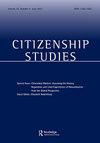斯洛伐克第一波COVID-19大流行期间罗姆人定居点的证券化和军事化隔离
IF 1.9
3区 社会学
Q3 POLITICAL SCIENCE
引用次数: 1
摘要
最近的分析表明,冠状病毒大流行对罗姆人造成了不成比例的影响,加剧了已有的排斥、贫困和歧视,使边缘化的罗姆人比以往更加脆弱。本研究探讨了斯洛伐克第一波COVID-19大流行期间罗姆人定居点的证券化和军事化隔离。该研究分析了谁、如何以及为什么将罗姆人社区证券化?在什么问题上,为谁?在什么条件下产生了什么结果?从合法性、必要性、相称性和临时性等方面调查了证券化的结果,即对六个罗姆人定居点进行军事化隔离。这个话题是从政治学的角度来探讨的。本研究采用新的制度主义研究方法,以证券化为分析框架,采用定性研究设计。这包括案例研究、精英访谈和定性内容分析。该研究的结论是,在斯洛伐克的第一波COVID-19大流行中,证券化取代了基于权利的话语和对最脆弱和被社会排斥的MRCs的人道主义方法。斯洛伐克对罗姆人采取了高度证券化的应对措施,有选择地和集体地针对他们采取抗冠状病毒措施。六个罗姆人定居点的居民遭受了其他人口所没有的歧视和最严格的限制措施。本文章由计算机程序翻译,如有差异,请以英文原文为准。
Securitization and militarized quarantine of Roma settlements during the first wave of COVID-19 pandemic in Slovakia
ABSTRACT Recent analysis indicates that the coronavirus pandemic has disproportionately affected Roma people, amplified pre-existing exclusion, poverty, discrimination, and exposed marginalized Roma to vulnerability even more than before. This study explores the securitization and militarized quarantine of Roma settlements during the first wave of the COVID-19 pandemic in Slovakia. The study analyzes who, how and why securitized Roma communities? On what issues and for whom? With what result and under what conditions? The result of securitization, i.e. militarized quarantine of six Roma settlements is investigated in terms of legality, necessity, proportionality, and temporariness. The topic is approached from the perspective of political science. The study deploys a new institutionalism approach, securitization as an analytical frame, and qualitative research design. This includes a case study, elite interviews, and qualitative content analysis. The study concludes that, in the first wave of the COVID-19 pandemic in Slovakia, securitization took place instead of right-based discourse and a humanitarian approach towards the most vulnerable and socially excluded MRCs. Slovakia deployed heavily securitized responses towards Roma, targeting them selectively and collectively with anti-corona measures. Residents of six Roma settlements were exposed to the discrimination and most restrictive measures that the rest of the population did not face.
求助全文
通过发布文献求助,成功后即可免费获取论文全文。
去求助
来源期刊

Citizenship Studies
POLITICAL SCIENCE-
CiteScore
3.60
自引率
11.10%
发文量
85
期刊介绍:
Citizenship Studies publishes internationally recognised scholarly work on contemporary issues in citizenship, human rights and democratic processes from an interdisciplinary perspective covering the fields of politics, sociology, history and cultural studies. It seeks to lead an international debate on the academic analysis of citizenship, and also aims to cross the division between internal and academic and external public debate. The journal focuses on debates that move beyond conventional notions of citizenship, and treats citizenship as a strategic concept that is central in the analysis of identity, participation, empowerment, human rights and the public interest.
 求助内容:
求助内容: 应助结果提醒方式:
应助结果提醒方式:


